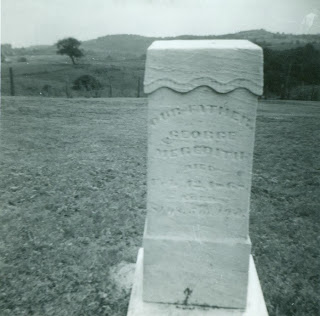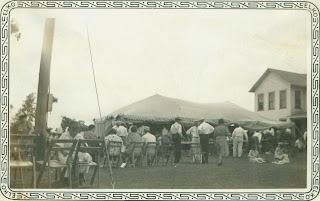by Ernest L. Meredith
June 20, 1980
To the descendants of James and Annie Webb Beazly, Mansfield Illinois:
I met these people in March 1925, when my Father and Mother rented a 240 acre farm near the Beazly farm. I am writing this so that you may know something about the people and some characteristics that may show up in your relatives.
Mr. Beazly was in rather poor health at that time having had a severe accident with a corn elevator when his forefinger became caught in the hopper chain and amputated it. He was a rather short man of average build, somewhat dark complexion. Mrs. Beazly was larger and taller than her husband. She was 20 years younger than he.
Mr. Beazly immigrated from Irelandia in 1890, to Mansfield where his sister, Minnie Howe (Mary Elizabeth) lived. He worked as a stone mason and carpenter for about a year, and bought an 80 acre farm 1/2 mile west of Mansfield. He returned to Ireland and married Annie Webb and came to their farm in Mansfield in August 1892.
To this union five children were born. Lizzie May, Mary Georgina, Geoffry, Percy Webb, and Ethel Louise. May who was much like her mother never married. Georgina who never married was slender and dark complexion and smaller than May. Geoffry was large and like his mother. Percy resembled his father.
Mr. Beazly was quiet and not easy to get acquainted with. Mrs. Beazly was the opposite. She met people easily and was very generous in nature. She helped the local doctor, Dr. Young, deliver babies and helped him whenever there was need in the neighborhood. She was a good organizer and manager. These people were thrifty and hard working.
Mr. Beazly was inventive. He designed and built a horse drawn potato planter, also a horse drawn dump wagon that he used to haul cow and horse manure from town to his farm and dump it in piles, which he would later spread by hand. He raised potatoes to sell and hauled them to Farmer City, to the father of the present Jesse Hammer, hauled by horse and wagon.
In 1907 he built the new house, one now standing on the original 80 acres. Then he purchased the 80 just across the road. Then in about 1924 he purchased the 80 acres 2 miles west of the home place and south, known as the Goodal place, now owned by the Percy Beazly family. The 80 acres next to Mansfield was known as General Mansfield Farm.
His sister and husband, Minnie and Joe Howe, owned a 200 acre farm west of the Beazly farm, one mile (now owned by Dean and James Beazly) west which Geoffry and Percy rented at the time I met them.
The Beazly's came to US to get away from the Catholics and Protestants fighting in Ireland. The church at Mansfield where they belonged was known then as Methodist Episcopal. The family were very active in church work. Mrs. Beazly was on many committees through the years and was the right hand with the pastor, whoever he was.
Mrs. Beazly could make a dollar go farther than any one I ever knew. She saw to it that her family was well fed, clothed, and used their abilities to their best advantage. Georgina and Ethel both became teachers and Ethel graduated from two year course and Georgina got her Bachelors degree from Normal and later her Masters Degree from University of Illinois. She had a brilliant mind and a lot of drive and ambition. She never was in good health. After Ethel's graduation we were married June 23, 1927.
Percy married Eleanor Randall. To this union were born 3 boys and 1 girl. Geoffry married Laura Bell. She was a former missionary to India. She passed away. To this union were born Samuel and Brenton. He later married a widow, Irene Lawson, they had no children.
When I met the Beazly's the economy was just recovering from World War I and the depression of 1920. Mrs. Beazly had discovered that raising chickens and selling eggs was a pretty good way to get some money. She had the boys build two brooder houses that would hold 200 baby chicks, and a large laying house where they kept upwards of 200 layers. Eggs were cheap but you could trade them for groceries. Each farmer milked a few cows and raised some pigs. About this time there came into being egg and cream buying stations. They shipped cases of eggs to Chicago and 5 or 10 gallon cans of cream. There was a train that made a daily trip into Chicago, called a local. Eggs were 10 to 25 cents per dozen. Every one had a cream separator. Cream was worth $3.00 to $5.00 per can.
They bought an incubator that was heated with kerosene and held about 20 dozen eggs. If you got 80% hatched, you did real well. Men's work shirts were 50 cents to $1.00. Overalls were $1.50 and other things in proportion.
Geoffry worked for Pete Wolfe who had a corn sheller. Pay was $1.50 to $2.00 per day. The Beazly boys bought a corn sheller after they had bought a steel wheeled Avery. They also did some neighborhood shelling and threshing.
Mrs. Beazly was very patriotic and helped raise money for Red Cross and War Bonds. She was head of the knitting committee and the night before Dr. Young left for service she stayed up most of the night to make his sweater and the like. The men did not get these issued to them as they do today. He was called up suddenly. Another committee she was on raised money for the Red Cross. She had gotten a small sack of Gold Medal Flour that held a few ounces of flour that was sold over and over for 1,000's of dollars. Times were hard, but then came the crash of 1929.
The Beazly's attended church regularly and then in the afternoon they went to Lindsey chapel about 4 miles north of Mansfield when the weather permitted. They walked to church, even at night when the roads were too bad for the horse.
Mrs. Beazly died of cancer of the mouth, caused by a decayed tooth. Mr. Beazly died of cancer of the prostrate gland. May's death was caused by strep infection of the adrenal gland.
When the new church was built in Mansfield, the boys tore down the old church and used the lumber to build brooder houses and laying houses. I helped some and got enough to build us a brooder house. Both boys helped build the new church.
There were no luxuries in those days. We were all glad to get by with the bare necessities. It was 1939 to 1940 before farmers began to make money.


























